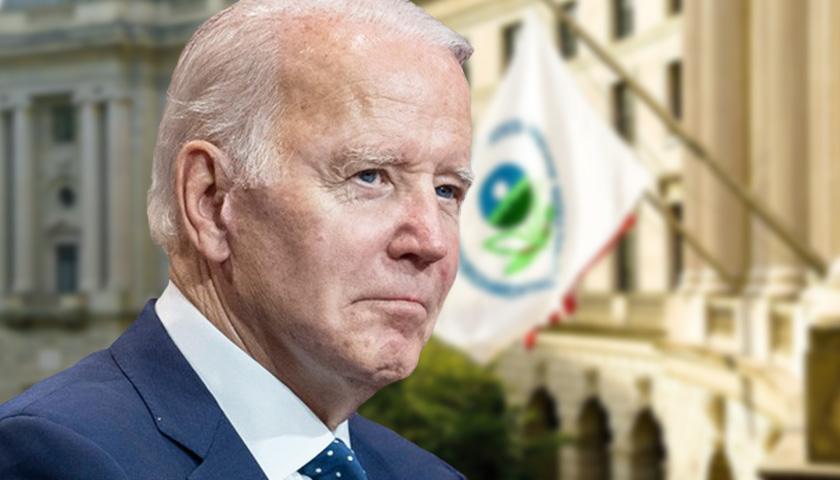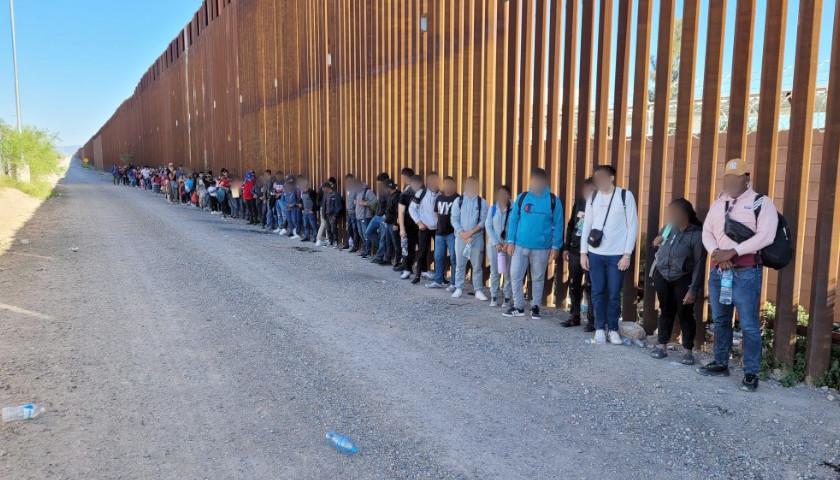by John Hugh DeMastri
President Joe Biden vetoed a bipartisan bill Thursday that would limit his administration’s broad interpretation of the “waters of the United States” (WOTUS) rule that grants the Environmental Protection Agency (EPA) significant new authority.
The president rejected the bill, arguing that his administration’s new rule provides “clear rules of the road” to protect both economic efforts and water quality under the Clean Water Act, according to the veto. The rule dramatically expands the traditional limits of WOTUS — which allow the EPA to regulate navigable waters — to include all territorial seas, interstate waters, adjacent wetlands, traditional waters’ tributaries and some artificial reservoirs.
“The resolution would leave Americans without a clear definition of ‘Waters of the United States,’” Biden said in the veto. “The increased uncertainty caused by H.J. Res. 27 would threaten economic growth, including for agriculture, local economies, and downstream communities.”
Opponents of the rule currently lack the votes required to overcome the president’s veto.
 Following a presidential veto, “Americans will need to hope the Supreme Court makes it clear that these EPA bureaucrats are way outside the authority that Congress actually provided in the Clean Water Act,” Senate Minority Leader Mitch McConnell said in a March statement following the resolution’s passage by the Senate. He decried the Biden administration’s interpretation of the rule as a “radical power grab that would give federal bureaucrats sweeping control over nearly every piece of land that touches a pothole, ditch, or puddle.”
Following a presidential veto, “Americans will need to hope the Supreme Court makes it clear that these EPA bureaucrats are way outside the authority that Congress actually provided in the Clean Water Act,” Senate Minority Leader Mitch McConnell said in a March statement following the resolution’s passage by the Senate. He decried the Biden administration’s interpretation of the rule as a “radical power grab that would give federal bureaucrats sweeping control over nearly every piece of land that touches a pothole, ditch, or puddle.”
President Biden has once again turned his back on Iowa farmers and rural America.
His veto of @HouseGOP’s bipartisan resolution to overturn his overreaching WOTUS rule will saddle our producers with red tape, increase grocery bills for our families & threaten our food security.
— Rep. Randy Feenstra (@RepFeenstra) April 6, 2023
Sen. Joe Manchin of West Virginia, one of four Democratic senators who supported the bill, also issued a statement in March, encouraging the president to sign the bill.
“The Administration’s WOTUS rule is yet another example of dangerous federal overreach,” said Manchin in the statement. “The proposed changes would inject further regulatory confusion, place unnecessary burdens on small businesses, manufacturers, farmers and local communities, and cause serious economic damage. It is essential to ensure clean water for all West Virginians and Americans, but we can achieve this without regulating our hard-working people out of business.”
“The Biden administration’s WOTUS rule creates unnecessary confusion & burdensome red tape for [Montana] farmers, ranchers & landowners—that’s why the Senate voted to overturn it,” Republican Sen. Steve Daines said in a tweet immediately following the announcement. “[Joe Biden’s] veto today shows just how far he’s willing to go to impose big government regulations on [Montanans].”
A federal judge in late March stopped the Biden administration from implementing the rule in Texas and Idaho. At the time, the EPA told the Daily Caller News Foundation that it believes the expanded rule “is the best interpretation of the Clean Water Act,” and noted that it was still going into effect “in all other jurisdictions in the U.S.”
The EPA did not immediately respond to a DCNF request for comment.
– – –
John Hugh DeMastri is a reporter at Daily Caller News Foundation.
Photo “Joe Biden” by President Joe Biden. Background Photo “Environmental Protection Agency” by USEPA Environmental-Protection-Agency.






Way too much power is held in DC by non-elected bureaucrats. The EPA chief has more individual power than any congressman, they have more power than any state governor yet are not accountable to electorate or congressional control. Yes, congress can impeach but that rolls out in a partisan argument with one party having to prosecute the director who was appointed by the head of that party, i.e., the president. I am sure the Supreme Court will over rule this directive but at great expense for the taxpayer and at a burden for the farmer.